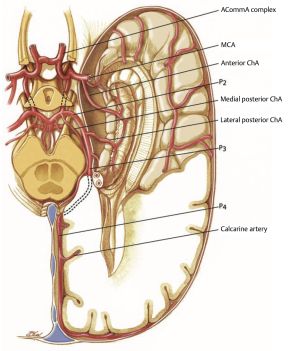Posterior Cerebral Artery: Difference between revisions
Jump to navigation
Jump to search
No edit summary |
|||
| Line 14: | Line 14: | ||
<tr> | <tr> | ||
<td>Posterior thalamoperforator arteries</td> | <td>Posterior thalamoperforator arteries</td> | ||
<td>From the basilar artery and P1, travels through the posterior perforated substance behind the mamillary bodies | <td> | ||
* From the basilar artery and P1, travels through the posterior perforated substance behind the mamillary bodies | |||
* Supply: thalamus, hypothalamus, subthalamus, and midbrain ([[cranial nerves]] III and IV)</td> | |||
</tr> | </tr> | ||
<tr> | <tr> | ||
| Line 27: | Line 29: | ||
</tr> | </tr> | ||
</table> | </table> | ||
= Vascular territory = | = Vascular territory = | ||
Revision as of 14:41, 3 March 2024

Anatomical segments
- P1: PCA from the origin to posterior communicating artery (AKA mesencephalic, precommunicating, circular, peduncular, basilar...). The long and short circumflex and thalamoperforating arteries arise from P1
- P2: PCA from origin of PComA to the origin of inferior temporal arteries (AKA ambient, post-communicating, perimesencephalic), P2 traverses the ambient cistern, hippocampal, anterior temporal, peduncular perforating, and medial posterior choroidal arteries arise from P2
- P3: PCA from the origin of the inferior temporal branches to the origin of the terminal branches (AKA quadrigeminal segment). P3 traverses the quadrigeminal cistern
- P4: segment after the origin of the parieto-occipital and calcarine arteries, includes the cortical branches of the PCA
P1 segment
| P1 Segment | Feature |
|---|---|
| Posterior thalamoperforator arteries |
|
| Medial posterior choroidal arteries |
|
| Meningeal branches | Supply: tentorium and the falx |
Vascular territory
- parietooccipital sulcus (medial) and inferior temporal sulcus (lateral)